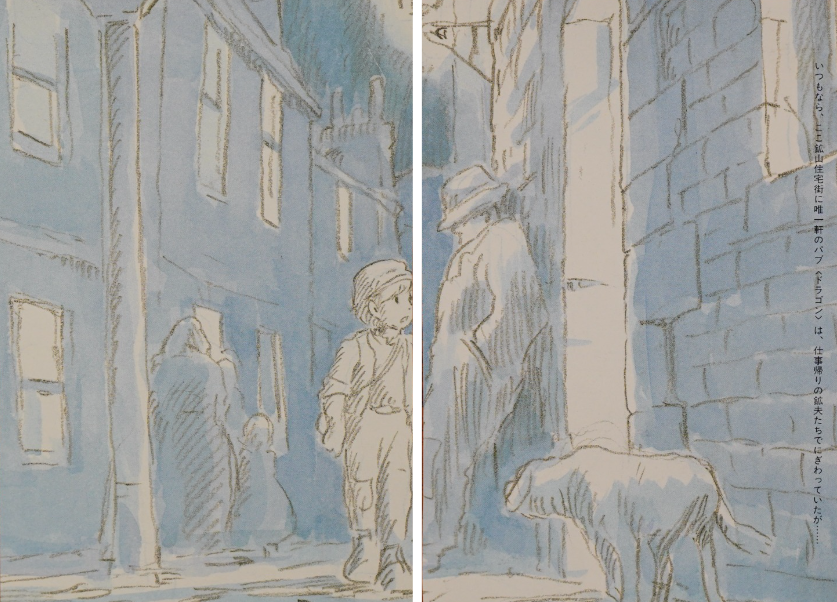
Slag Valley
“Hey, make way!”
A steam-powered agricultural vehicle carrying a mountain of vegetables was pushing through a crowd of miners returning early, barely making it to the entrance of Slag Valley.
“Such a crowded town, every single time.”
The farmer, irritated, was hurrying to reach the evening market on time.
Once he climbed that small hill, it would be just a short distance to the miners’ housing below.
For the nearby farmers, this mining town was a valuable place to quickly sell their produce. However, according to the farmer:
“When compared to my grandfather’s time, the profits are nothing.”
Once, this place was a “prime mine” that produced a large amount of iron ore, as well as gold, silver, and copper. Now, the amount of iron ore had decreased, and they were mostly extracting tin.
The Industrial Revolution that took place just a few decades ago from this era demanded so much ore.
Furthermore, it used to be common to build factories near mines. But as the new wave of industrialization surged, these inconveniently located inland factories started losing their workforce.
Transport using light railways and canals had become outdated.
At some point, the town came to be known as “Slag Valley,” which means “Valley of the Ore Residue.”
“A place without a port is doomed.”
But even if it’s considered doomed, this area still has the most populated mine. The farmer sighed and set up his stall in a corner of the mining housing.
Along the street, there were others selling fruits and bread.
It’s almost time for dinner preparations, but there aren’t many people around yet.
“Mister, do you have good corn?”
“Oh, Pazu, you’re early today. Finished work already?”
“Yeah, I’ve been unlucky lately. Can’t seem to find a good vein of ore.” He sounds mature, but he’s probably only twelve or thirteen.
The boy took out a copper coin as if searching his pocket.
“Here, take three.”
The farmer held out the corn by its silk.
“This much, really?”
“Yes, with times being tough, even your boss wouldn’t give you this much.”
“Thank you.”
“By the way, Pazu, I heard an interesting story the other day.”
But as the farmer was putting the copper coin into the can and about to speak, Pazu, with his tool bag swinging from his shoulder, was already running up the slope to the miners’ housing.
Somewhere in the middle of the housing with signs for sale items, there’s the house of Pazu’s boss. In front of the house, the boss’s daughter, little Maggi, was playing.
“Maggi, isn’t it time for dinner?”
“Oh, it’s Pazu. Mom, Pazu’s here!”
Maggi, noticing Pazu coming back from work, informed her mother.
A voice came from the back kitchen.
“Pazu, eat with us tonight. I’ve made a feast.”
“It’s a pie with potatoes and chicken.”
Maggi joyfully pulled Pazu’s hand, leading him inside.
“The boss went to report on the ores, so he might be late. We were hoping for it. Everyone said it was a promising vein.”
“Oh well, can’t be helped. Wash your hands.”
It seems like the lady of the house is used to it; she wasn’t too disappointed and continued her chores.
The boss returned during the meal.
The boss, a bona fide miner, has been living here since his father’s time.
He’s strict, perhaps too strict, about work, but he has a kind heart.
A few years ago, after losing both his parents, Pazu was left alone in the world. The boss took him in, allowing him to work as a trainee mechanic in the mine.
“I started (eating) before you.”
“Yes, I knew you were coming, Pazu. Good timing. I just heard a funny story.”
The boss, while eating, began to share a humorous story he’d heard.
It happened in a village to the west of Slag Valley, near where the vegetable seller was earlier.
In the afternoon, a farmer leisurely driving his harvester was heading for his afternoon work.
Upon spotting sheep that had strayed into his canola field, the farmer got down from his harvester to chase them out. As he approached the fence and got closer, the few sheep scattered, bleating.
At that moment—.
The farmer froze, as if seized by a sudden spasm, and stopped in his tracks.
There, as if it had fallen from a great height, was something deeply embedded in the soft soil of the field.
A person…? No, something different. Bigger. What… what is that?
It wasn’t just a casual observation. The farmer was paralyzed with terror, fearing that the thing might suddenly rise up, or that if he tried to flee, it might chase him from behind. Such was his fear that he couldn’t even turn away.
It seemed to have a head, but it was too small in proportion to its body. For starters, its unusually long arms and legs looked skeletal, as if they were made of just bones. Multiple joints could be seen on them, too.
From a torn wrist, countless thin, wire-like things could be seen.
It had… no eyes.
The sharply indented area looked somewhat like a launch port.
And on its arm, countless protrusions were lined up like fish bones.
If the sheep that had come closer again hadn’t bleated at that moment, the farmer would have undoubtedly fainted.
“Some say he actually did faint,” as the villagers’ gossip went.
In any case, shaken from his paralysis by the sheep’s cry, the farmer let out a bizarre scream and ran back to the village as if he was tumbling.
Upon receiving this report, the village chief immediately organized a vigilante group, and, leading a procession of villagers, headed to the scene.
Because of dilly-dallying, it was already close to noon the next day.
Regarding the appearance, someone remarked,
“It was like the ‘Witch Hunt’ we hear about from the elderly.”
If they had swords or blades, it was somewhat better, but some came with kitchen knives, pestles, sickles, and even some who brought out useless matchlock guns.
They had a lot of energy, but they couldn’t easily cross the fence.
For several hours, they surrounded the strange object, throwing stones at it and prodding it with long sticks.
Only after ensuring that it showed no sign of movement, the village chief instructed the villagers to call the priest.
Upon arriving, the priest immediately exclaimed,
“It’s the devil, the devil’s bone!”
Given that he was considered the most knowledgeable in the village, some people appeared claiming they had thought the same thing since they first saw it. Thus, the conversation settled on that note.
An exorcism ceremony was solemnly conducted in the church.
Apparently, spectators even came from the neighboring village, suggesting that the rumor had spread quite a bit.
“Hey boss, was it really the ‘devil’s bone’?”
In this mining town, the term “devil” had already become obsolete.
Pazu thought, “I would’ve liked to see it.”
“Well, who knows what it was. Even the priest might not know, and he probably made some hasty conclusions. It’s probably just a prank from the neighboring village. …Hey, another cup of tea.”
“Me too!”
“However…” the boss’s story continued.
“You’d be surprised to hear that the military got involved in this ridiculous tale. They’re pretty idle, aren’t they?” Two days after the “devil” was discovered, when the exorcism ceremony was about to finish, a man was dispatched from Tidis, the largest fortress in the southern part of the country.
“Indeed, this is definitely a lesser demon,” declared a man in plain clothes, who entered the church brashly, protected by an armed squad, his voice echoing through the church.
“Priest, what do you intend to do with this devil?”
“I plan to bury it deep beneath the church.”
“With all due respect, priest, even if it’s no longer moving, it’s unsettling to leave it here. The military can bury it and keep watch over it 24/7. How about leaving it to us?”
Such a conversation took place between the priest and the man claiming to be a government official.
The priest felt slighted, thinking they looked down on his small church, but he had always found the idea of living above this “bone” creepy. So, he readily handed it over to the military.
— That night.
Finally free of the burden, as he was relaxing, a military envoy came.
After a detailed examination by the military, they informed him that the bone indeed belonged to a devil.
As a reward, the priest and the farmer who found it were given a sum of money.
“It’s strange they even gave money. But what a profit! I wonder if a devil will fall into our mine too. If so, we might be able to replace that worn-out pump valve.”
The boss laughed heartily.
Both the boss and the vegetable seller who told the story, and even the villagers themselves, had no doubts about the military’s overly agile actions. Even though not much time had passed since they “examined it in detail”…
And Pazu could never have imagined that this distant village’s “devil commotion” would eventually involve him in a transformed manner.
“Dad, play with me.”
Triggered by the boss starting to play with Madge, Pazu stood up.
“Thanks for the meal. Boss, see you tomorrow.”
“Bye-bye, Pazu.”
Madge waved from behind the boss.
It was already dark outside.
Illuminated by the moonlight, Pazu energetically ran up the brilliantly white path, heading towards his nest on the hill.
